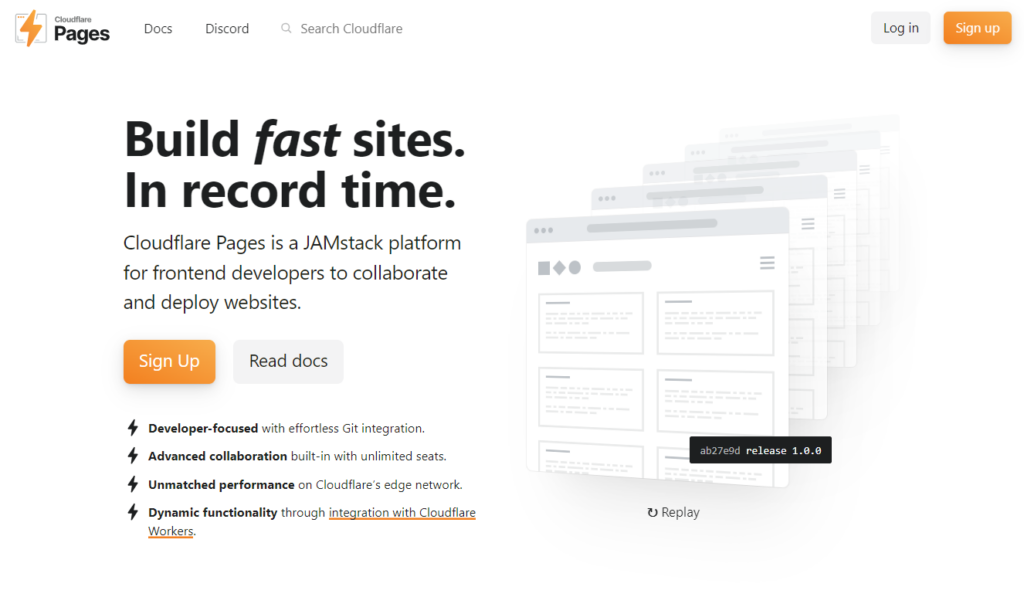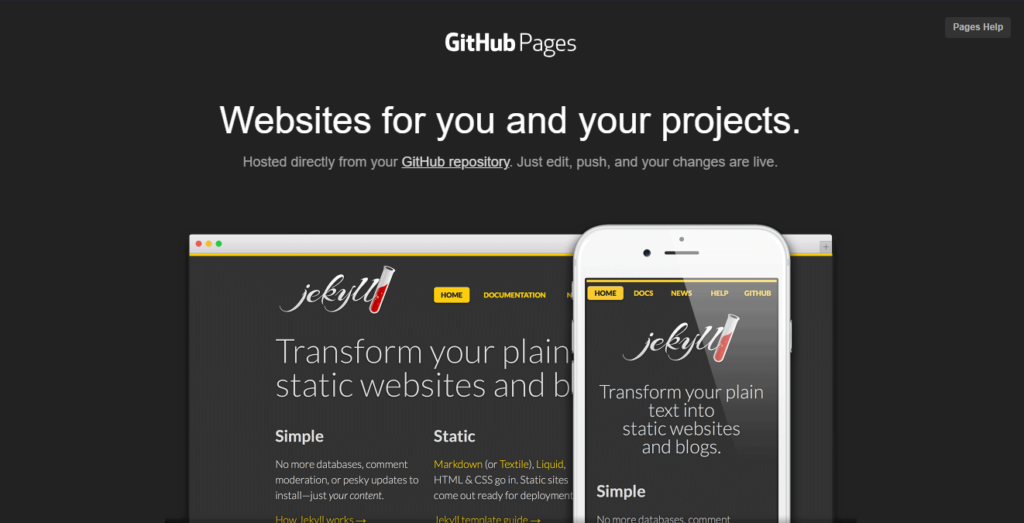Platforms High Level Comparisions
There are several platforms available for hosting a static website for free. Here are a few popular ones:
| PLATFORM | EASE OF USE | FREE PLAN | PAID PLAN |
|---|---|---|---|
| Netlify | Extremley Easy | Yes | $19 |
| CloudFlare Pages | Extremley Easy | Yes | $20 |
| GitHub Pages | Moderately Easy | Yes | $4 |
| GitLab Pages | Moderately Easy | Yes | $24 |
| Vercel | Difficult | Yes | $20 |
Netlify – The Big Boy of Hosting Platforms

Netlify is an excellent platform for hosting static websites and DigiBlog’s #1 pick on this list! It offers a seamless and straightforward setup process for both, uploading a website and mapping a custom domain to it. Additionally, Netlify provides features such as multiple custom domains, HTTPS, and form handling, which are typically not available with other free hosting options.
One of the standout features of Netlify is its speed. It uses a global content delivery network (CDN), which ensures that static websites load quickly, no matter where the user is located. This can be especially beneficial for businesses that want to provide a fast and responsive website experience for their customers.
Another advantage of Netlify is its reliability. The platform is built on top of Amazon Web Services (AWS), which is known for its scalability and high availability. This ensures that websites hosted on Netlify are always up and running, even during high traffic periods.
Is Netlify Really Free?
Yes! Netlify is free to start and you can upload and host a fully functional static website free of charge on their Starter plan. In fact, you can host multiple free static websites on Netlilfy’s Starter plan.
DigiBlog Advice: Though Netlify offers generous free plan, we suggest supporting their business by signing up for one of their paid plans – the PRO plan will do it.
Review the Netfliy pricing plans below to learn about differnt features available:

Can I Use My Own Domain with Netlify Starter plan?
Yes again! You can uses your own custom domain and redirect it to your Netlify hosted site. If you do not have a your own domain, you can buy one through Netlify. To buy a domain, Netlify will charge you $12.99 for the first year, and $17.99 for subsequent year, which is standard pricing. Netlify will not take advantage of you!
Overall, Netlify is an excellent choice for businesses that are looking for a reliable, fast, and feature-rich platform for hosting their static website for free. Its easy setup process, global CDN, and integration with other services make it an ideal option for small businesses and developers alike.
CloudFlare Pages

Cloudflare Pages is a relatively new platform for hosting static websites. It offers a simple and intuitive interface for deploying and managing websites, and it’s free to use.
One of the key advantages of Cloudflare Pages is its integration with Cloudflare’s global network. This means that websites hosted on Cloudflare Pages benefit from Cloudflare’s fast and secure content delivery network (CDN), which can improve website speed and reliability.
Cloudflare Pages also offers a wide range of integrations with popular development tools and services, such as GitHub, GitLab, and Bitbucket. This makes it easy to set up continuous deployment workflows and automate the deployment process.
Another notable feature of Cloudflare Pages is its custom domains support. You can easily add a custom domain to your website and Cloudflare Pages will automatically configure SSL certificates and DNS settings.
Overall, Cloudflare Pages is a solid choice for hosting static websites. Its fast and secure CDN, integration with popular development tools, and custom domain support make it a compelling option for small businesses and developers alike.
Is CloudFlare Really Free?

GitHub Pages

GitHub Pages is a free hosting platform for static websites. It’s an ideal option for developers, as it integrates with GitHub repositories. It also offers a custom domain option.
GitHub Pages is an excellent platform for hosting static websites for free. As a subsidiary of Microsoft, GitHub has become one of the most popular development platforms for open-source projects and is widely used by developers to host their code repositories. With GitHub Pages, users can host their static websites directly from their GitHub repositories.
One of the biggest advantages of using GitHub Pages is its integration with Git. GitHub provides users with an easy-to-use version control system that makes it simple to manage code changes. When changes are made to the website code, users can commit and push those changes to the repository, which automatically updates the hosted website.
GitHub Pages also supports custom domains, which is a valuable feature for businesses looking to establish a professional online presence. Users can link their GitHub Pages website to a custom domain of their choice, which can help enhance their brand and make it easier for users to find their website.
Additionally, GitHub Pages offers free HTTPS support, which provides website visitors with a secure connection to the site. This is particularly important for websites that require user input, such as contact forms or e-commerce sites.
Overall, GitHub Pages is an excellent option for hosting a static website for free. Its integration with Git and version control system makes it easy to manage website changes, and its custom domain and HTTPS support make it a professional and secure platform for businesses.
Are GitHub Pages Really Free?

GitLab Pages

GitLab Pages is a great option for hosting static websites for free. It’s similar to GitHub Pages, but it integrates with GitLab repositories. This makes it an ideal option for developers who are already using GitLab for version control.
One of the best things about GitLab Pages is how easy it is to set up. You simply need to create a new repository on GitLab, add your static website files, and enable GitLab Pages in the repository settings. GitLab Pages also supports custom domains, so you can use your own domain name for your website.
Another advantage of GitLab Pages is its integration with GitLab CI/CD pipelines. This allows you to automate the process of building and deploying your website, which can save you time and effort.
Overall, GitLab Pages is a reliable and user-friendly platform for hosting static websites. Its integration with GitLab makes it an excellent choice for developers who are already using GitLab for version control.
Are GitLab Pages Really Free?

Vercel

Vercel is a cloud-based platform that offers hosting for static websites. As a developer-focused platform, Vercel offers a range of features and tools that make it easy to deploy and manage static websites.
One of the standout features of Vercel is its integration with popular frontend frameworks such as Next.js and React. This makes it an ideal choice for developers who are already using these frameworks in their projects. Vercel also offers a simple and intuitive interface for managing deployments, which makes it easy to get started with.
Another advantage of Vercel is its performance. The platform is designed to be fast and optimized for static websites, which means that websites hosted on Vercel are likely to load quickly and provide a smooth user experience.
Vercel also offers a range of security features, including HTTPS by default and automatic SSL certificate management. This means that websites hosted on Vercel are secure and comply with modern web standards.
Overall, Vercel is a great option for developers who want a powerful and easy-to-use platform for hosting static websites. Its integration with popular frontend frameworks and focus on performance and security make it a compelling choice for small businesses and individual developers alike.
Final Thoughts
All of these platforms offer a simple and straightforward way to host a static website for free. It’s worth noting that some of these platforms may have limitations in terms of storage and bandwidth, so it’s important to review their terms and conditions before choosing one.





